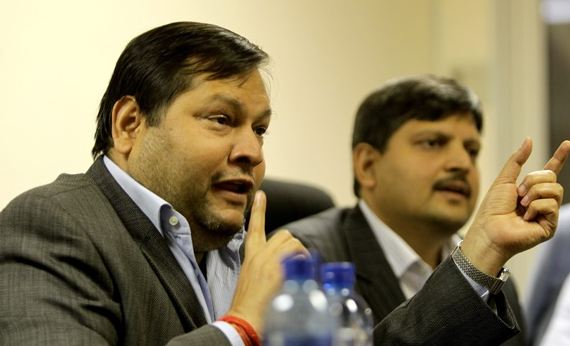The arrest in the United Arab Emirates (UAE) of the two brothers – Atul and Rajesh – belonging to the wealthy Gupta family, has sparked jubilation in the entire South Africa as the family has earned notoriety for virtually holding the state captive for about a decade to advance its multi-billion dollar family businesses. The infamous story has a striking parallel to cases of bank fraud and use of political clout by business magnates in India fleecing public exchequer.
Interestingly, criminals of such nature have mastered the art of looting the resources of the countries they live in and then flying away to foreign soils to escape the law of the land. While India and South Africa share a common glorious history of the non-violent movement experimented and perfected by Mahatma Gandhi, the Guptas hailing from India have besmirched the reputation of India with their shady deals worth 25 per cent of South Africa’s GDP, according to an estimate. Their influence on the then President of South Africa Jacob Zuma in using the state machinery for personal gains was such that a new epithet – ‘Zuptas’ – was coined in the country to derisively indicate the alleged nexus between the Guptas and Zuma.
The Gupta brothers fled South Africa after a judicial commission began probing their alleged involvement in corruption in 2018. They are accused of paying bribes to bag lucrative state contracts and having a hand in powerful government appointments. Of course, both the family and Zuma persistently deny any wrongdoing. A statement from Dubai Police said the two men were being held “in connection with money laundering and criminal charges in South Africa.” The force had acted after receiving an Interpol red notice which enjoins on government agencies to provisionally arrest a wanted person pending extradition. A third brother, Ajay, is also wanted by the South African authorities, but it is yet to be confirmed whether he too has been arrested.
The Gupta family’s rise is spectacular. In a way, one can find some common elements between them and the Nirav Modis and the Vijay Mallyas. The Guptas moved from India to South Africa in 1993 after facing accusations of money laundering in India. Indian tax officials raided properties belonging to them in 2018 in several cities, including their company office in Delhi. Most of the serious corruption allegations levelled against the Gupta brothers revolve round their relationship with Zuma, who was President of South Africa from 2009 till he was forced to step down in the wake of corruption allegations in 2018. The Gupta family is accused of using their close links with Zuma to wield political power extensively across all levels of South African government. They won business contracts allegedly influencing high-profile government appointments and misappropriating state funds. After the brothers fled the country, the South African government initially could not do anything to nab them since it had no extradition treaty with the UAE. But in 2021, the treaty was negotiated and the new President Cyril Ramaphosa’s government began efforts to get the Gupta brothers extradited. However, it is not yet clear whether the two brothers will be immediately extradited to South Africa following the arrests.
The list of public bodies accused of having been captured by the Guptas is long. Included in this list are the ministries of Finance, Natural Resources and Public Enterprises, as well as agencies responsible for tax collection and communications, the national broadcaster SABC, the national carrier South African Airways, the state-owned rail-freight operator and the energy giant Eskom – one of the largest utility companies in the world.
A four-year investigation later published by the country’s top judge concluded that the brothers had become deeply embedded in the highest levels of government and Zuma’s ruling African National Congress (ANC) party. Reports published this year by investigators accused the brothers of being linked to racketeering activity through the procurement of rail, ports and pipeline infrastructure. Its authors said Zuma “would do anything that the Guptas wanted him to do for them.” Last year, Zuma was imprisoned for 15 months for refusing to testify before the same investigators. He was released on parole after serving two months of his sentence in jail.
A protracted legal battle is on the cards in South Africa as the cash-rich Gupta family will use their resources to defeat the prosecution case. South Africa’s economy is in shambles and the government is known to be begging lawyers to fight its cases. It is imaginable how such lawyers will fare against the battery of eminent and efficient lawyers the Guptas will engage. The new President is also accused of indulging in corruption and using the cases against the Guptas, Zuma and other big fish as a witch-hunt.
Whatever the fate of South Africa’s investigation and prosecution, the case of the Guptas will stand out as a great indicator of how Indians can excel in being corrupt themselves and succeeding in corrupting the best anywhere the sun shines.
